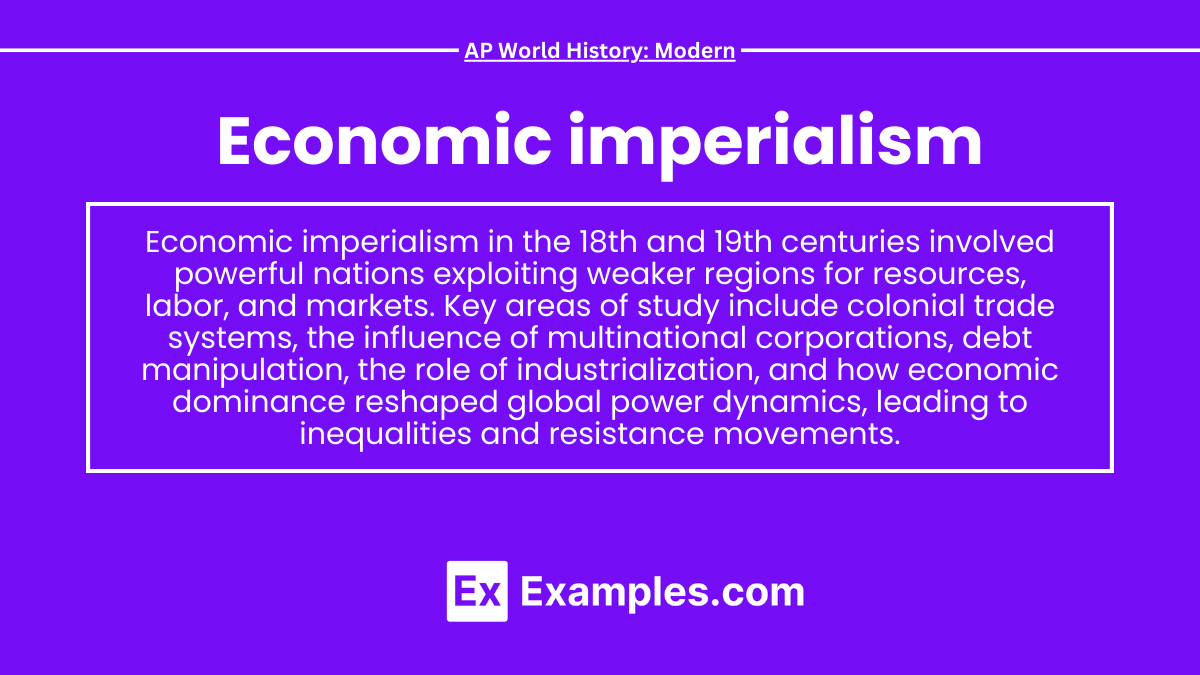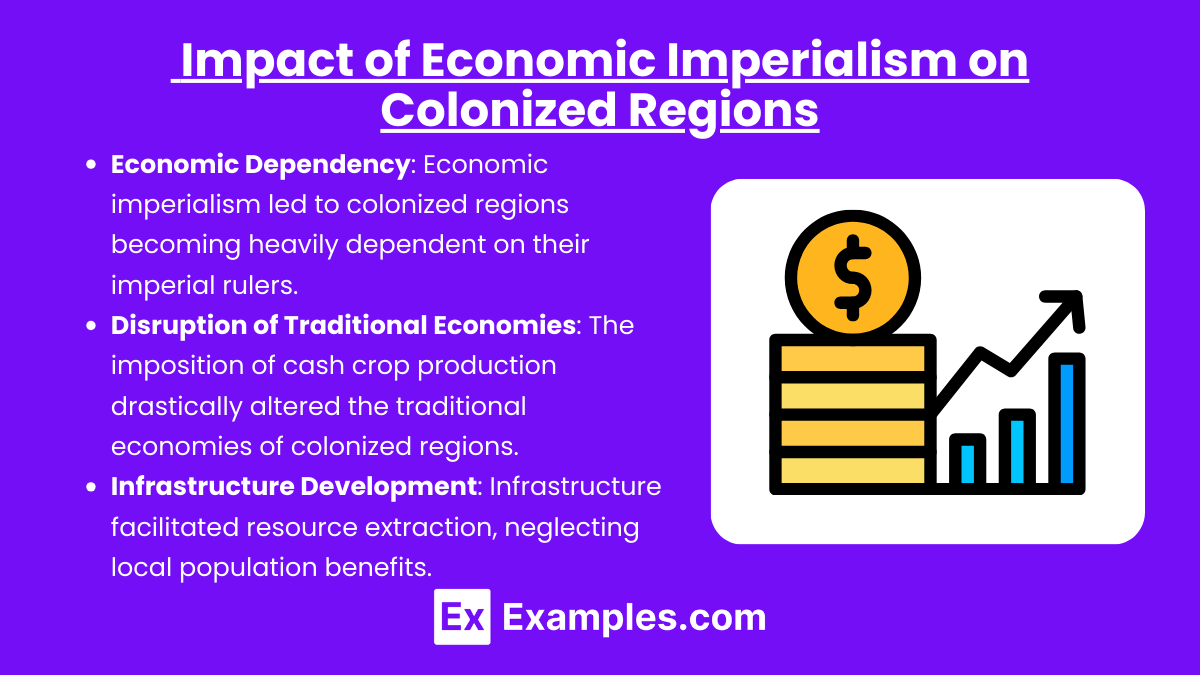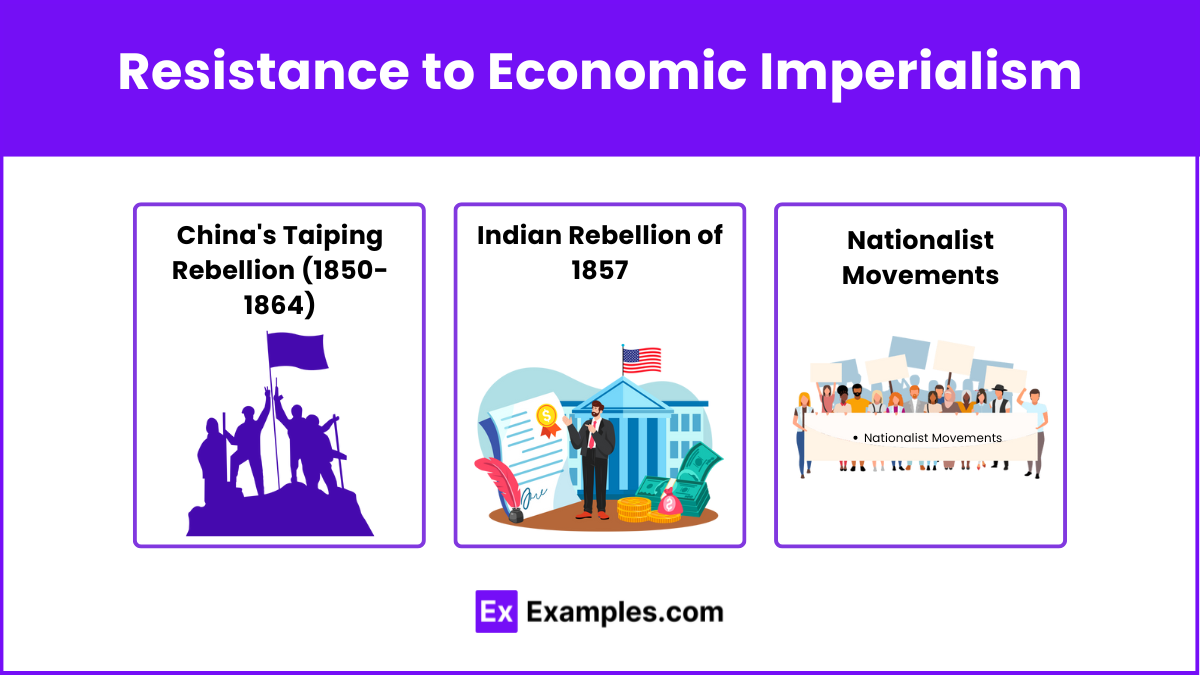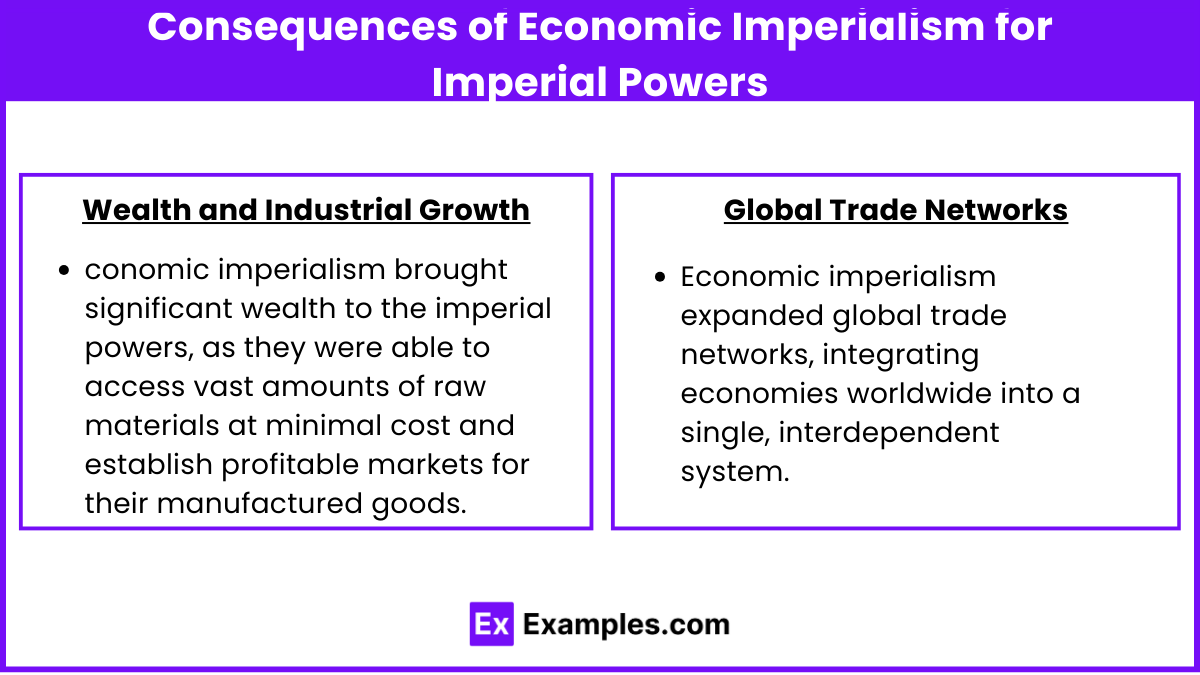Economic imperialism refers to the dominance of powerful nations over weaker regions through economic means rather than direct political control. From the 19th to early 20th centuries, European powers, the United States, and Japan exploited resources, established trade dominance, and imposed economic dependence on regions in Africa, Asia, and Latin America, shaping global economic relationships and inequalities.
Free AP World History: Modern Practice Test
Learning Objective
In studying "Economic Imperialism" for AP World History: Modern, you should learn to identify the key characteristics of economic imperialism, including how industrialized nations exerted control over foreign markets and resources. Analyze the impact of economic exploitation on local economies and societies, including the effects of colonization on labor practices and resource distribution. Evaluate the consequences of economic imperialism on global trade patterns, the emergence of resistance movements, and the long-term effects on former colonies and their paths to independence.
1. Economic Imperialism in Africa
Economic imperialism in Africa refers to the continued exploitation and control of African resources and economies by foreign powers, even after formal decolonization. Despite gaining political independence, many African nations remained economically dependent on former colonial powers and multinational corporations that dominated industries such as mining, agriculture, and energy. Western countries, as well as new economic powers like China, have been accused of engaging in neo-colonialism through unfair trade practices, debt dependency, and resource extraction, often benefiting foreign interests at the expense of local economies. This has hindered economic development and exacerbated poverty, inequality, and political instability across the continent.
Colonial Exploitation
European powers, including Belgium, Britain, France, and Germany, heavily exploited Africa's vast resources in the late 19th and early 20th centuries. These imperialist countries sought to extract valuable commodities such as rubber, gold, diamonds, ivory, and other minerals, transforming Africa into a source of raw materials that fueled European industries. Additionally, they established Africa as a market for European manufactured goods, creating a system that benefited the imperial powers while depleting the continent's resources. African societies were often coerced into labor, and traditional livelihoods were disrupted, as European powers imposed cash crop systems that prioritized export over local needs.
Case Study - Congo Free State
One of the most notorious examples of economic imperialism was the Congo Free State, which was personally controlled by King Leopold II of Belgium from 1885 to 1908. Under his rule, the Congo became a site of extensive exploitation, primarily focusing on rubber extraction. Local populations were subjected to forced labor, brutal treatment, and severe punishments for failing to meet rubber quotas. The Belgian administration’s actions led to widespread atrocities, resulting in the death of an estimated 10 million Congolese people. This case exemplifies how economic imperialism could lead to extreme human rights abuses and set a precedent for the exploitation of African resources under European rule.
2. Impact of Economic Imperialism on Colonized Regions
Economic Dependency
Economic imperialism led to colonized regions becoming heavily dependent on their imperial rulers. European powers structured the economies of these regions to serve their interests, ensuring that colonies provided raw materials, such as minerals and agricultural products, to feed European industries. In return, colonies had to purchase finished goods from their imperial rulers, stifling the development of local industries. This dependency created a cycle where colonies could not develop diverse, self-sustaining economies, leaving them vulnerable to the fluctuations of global commodity prices and demand.
Disruption of Traditional Economies
The imposition of cash crop production drastically altered the traditional economies of colonized regions. Subsistence farming, which allowed communities to sustain themselves, was replaced with the cultivation of crops like cotton, cocoa, rubber, and coffee for export. This shift made local populations reliant on single-crop economies, exposing them to the volatility of international markets. When global demand or prices dropped, these regions faced severe economic crises, leading to poverty and food shortages.
Infrastructure Development
While economic imperialism led to the development of infrastructure such as railways, roads, and ports, these improvements were primarily designed to facilitate the extraction and export of resources rather than benefit the local population. Railways connected mining sites or plantations to ports but did little to improve transportation for ordinary people or to integrate different regions within the colonized country. This infrastructure served the imperial powers' interests, enabling them to transport resources efficiently while providing minimal long-term benefits to the colonized nations.
3. Resistance to Economic Imperialism
China's Taiping Rebellion (1850-1864)
The Taiping Rebellion was one of the deadliest conflicts in history, partly fueled by China's frustration with foreign economic exploitation. Western powers, particularly Britain, had imposed unequal treaties that forced China to open its markets, pay reparations, and allow the opium trade. The rebellion, which was partly an expression of resentment against foreign economic control, led to significant upheaval and loss of life, with estimates of up to 20 million deaths. Although the rebellion was ultimately suppressed, it marked a significant challenge to the economic dominance of foreign powers in China.
Indian Rebellion of 1857
In India, the British East India Company's economic policies, including heavy taxation and the introduction of British-manufactured goods that undermined local industries, sparked widespread resentment. The Indian Rebellion of 1857, also known as the Sepoy Mutiny, was a direct response to these exploitative practices, combined with cultural and religious grievances. Though the rebellion was unsuccessful, it highlighted the growing dissatisfaction with economic imperialism and eventually led to the dissolution of the East India Company, bringing India directly under British Crown rule.
Nationalist Movements
Economic imperialism played a crucial role in sparking nationalist movements across colonized regions. As people became increasingly aware of how imperial powers exploited their resources, they began to demand independence and control over their economies. In the late 19th and early 20th centuries, nationalist leaders in Africa, Asia, and Latin America organized resistance against economic exploitation, forming political organizations, labor unions, and armed resistance movements. This resistance laid the foundation for future struggles for independence, which gained momentum after World War II.
4. Consequences of Economic Imperialism for Imperial Powers
Wealth and Industrial Growth
Economic imperialism brought significant wealth to the imperial powers, as they were able to access vast amounts of raw materials at minimal cost and establish profitable markets for their manufactured goods. This influx of resources fueled industrial growth, enabling countries like Britain, France, and Germany to expand their industries and increase their global economic dominance. The wealth generated from colonies helped finance technological advancements, infrastructure projects, and military expansion, further strengthening the power of the imperialist nations.
Global Trade Networks
Economic imperialism expanded global trade networks, integrating economies worldwide into a single, interdependent system. Colonized regions supplied raw materials, while industrialized nations produced finished goods, creating a system that linked distant economies. However, this trade network was unequal, as it favored the imperial powers, who reaped the benefits of trade at the expense of the colonized nations. This inequality contributed to global economic imbalances that continue to shape international relations today.
Examples
Example 1: British Control of India
The British East India Company monopolized Indian trade, exploiting resources like cotton and tea, turning India into a market for British goods.
Example 2: Opium Wars in China
Britain forced China to open its markets to opium trade, resulting in unequal treaties, economic control, and exploitation of Chinese resources.
Example 3: United States in Latin America
Through policies like the Monroe Doctrine, the U.S. dominated Latin American economies, controlling resources and influencing politics to benefit American businesses.
Example 4: Congo Free State (Belgium):
King Leopold II exploited Congo's rubber resources through forced labor, resulting in severe atrocities and wealth extraction, showcasing extreme economic imperialism.
Example 5: French Economic Influence in West Africa
France exploited West African colonies for raw materials like cocoa and peanuts, imposing cash crop economies that benefited French industries over locals.
MCQs
Question 1:
Which country used the Opium Wars to establish economic dominance over China?
A) France
B) Germany
C) Britain
D) United States
Answer: C) Britain
Explanation: Britain fought the Opium Wars to force China to open its markets to British goods, particularly opium, gaining economic control and trade advantages.
Question 2:
What was the primary resource exploited by King Leopold II in the Congo Free State?
A) Gold
B) Rubber
C) Diamonds
D) Ivory
Answer: B) Rubber
Explanation: King Leopold II of Belgium exploited rubber resources through forced labor, using economic imperialism to extract wealth, leading to severe atrocities in the Congo.
Question 3:
How did the United States exert economic imperialism in Latin America?
A) Colonization
B) Trade Embargo
C) Monroe Doctrine
D) Cultural Exchange
Answer: C) Monroe Doctrine
Explanation: The Monroe Doctrine allowed the U.S. to exert influence over Latin American economies, ensuring American dominance and access to resources and markets.






